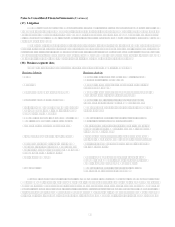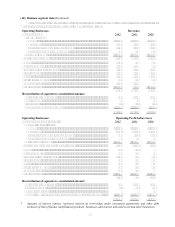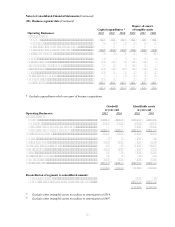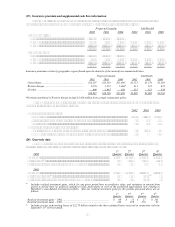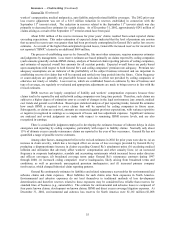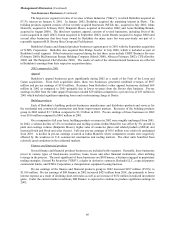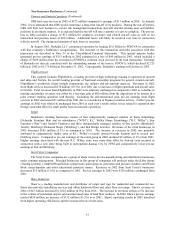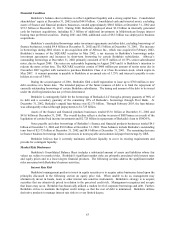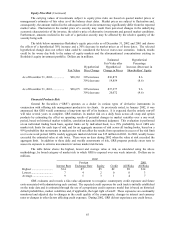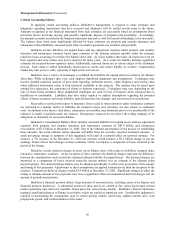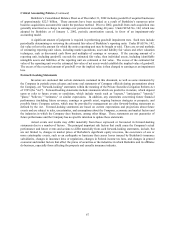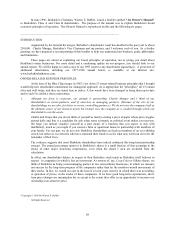Berkshire Hathaway 2002 Annual Report Download - page 59
Download and view the complete annual report
Please find page 59 of the 2002 Berkshire Hathaway annual report below. You can navigate through the pages in the report by either clicking on the pages listed below, or by using the keyword search tool below to find specific information within the annual report.
58
Management's Discussion (Continued)
Insurance — Underwriting (Continued)
Berkshire Hathaway Reinsurance Group (Continued)
Retroactive reinsurance contracts indemnify ceding companies for losses arising under insurance or
reinsurance contracts written in the past, usually many years ago. While contract terms vary, losses under the
contracts are subject to a very large aggregate dollar limit, occasionally exceeding $1 billion under a single contract.
Generally, it is also anticipated, although not assured, that claims under retroactive contracts will be paid over long
time periods. As a result, premiums paid by ceding companies are, in part, discounted for time value. However,
these contracts do not produce an immediate underwriting loss for financial reporting purposes. The excess of the
estimated ultimate claims payable over the premiums received is established as a deferred charge asset which is
subsequently amortized over the expected claim settlement periods. Such amortization is included as a component
of losses incurred and essentially represents the net underwriting losses from this business in each of the past three
years.
Retroactive reinsurance contracts are expected to generate significant underwriting losses over time due to
the amortization of these deferred charges. This business is accepted due to the exceptionally large amounts of float
generated which totaled about $7.5 billion at December 31, 2002. Unamortized deferred charges under BHRG
contracts were $3.2 billion at December 31, 2002 and $3.1 billion as of December 31, 2001. It is currently expected
that losses incurred in 2003 will include about $400 million of deferred charge amortization from contracts in effect
as of December 31, 2002.
In 2002, BHRG wrote an increasing amount of business under quota-share contracts. Most of the
increased premium volume in 2002 derived from several new contracts with Lloyd’ s syndicates and from a new
contract with a major U.S. based insurer. In a quota-share arrangement, BHRG essentially participates
proportionately in the premiums and claims of the business written by the ceding company. BHRG was willing to
enter into these new contracts because it believed the level of rate adequacy in certain property/casualty markets was
much improved in relation to past years. BHRG’ s continued participation in this business will depend on the
availability of other sources of capacity for Lloyd’ s syndicates as well as the expectation of continued rate adequacy
of the Lloyd’ s business being reinsured. Accordingly, the level of this business expected to be written in 2003 is
uncertain.
Berkshire Hathaway Primary Group
Berkshire’ s other primary insurance businesses consist of a wide variety of smaller insurance businesses
that principally write liability coverages for commercial accounts. These businesses include: National Indemnity
Company’ s primary group operation (“NICO Primary Group”), a writer of motor vehicle and general liability
coverages; U.S. Investment Corporation (“USIC”), acquired by Berkshire in August 2000 and whose subsidiaries
underwrite specialty insurance coverages; a group of companies referred to internally as “Homestate” operations,
providers of standard multi-line insurance; and Central States Indemnity Company, a provider of credit and
disability insurance to individuals nationwide through financial institutions.
Collectively, Berkshire’ s other primary insurance businesses produced earned premiums of $712 million in
2002, $501 million in 2001 and $325 million in 2000. The increases in premiums earned during the past two years
were largely attributed to increased volume at USIC and the NICO Primary Group. Net underwriting gains of
Berkshire’ s other primary insurance businesses totaled $32 million in 2002, $30 million in 2001 and $25 million in
2000. The improvement in year-to-year comparative underwriting results was due in large part to USIC and the
NICO Primary Group offset by poor results in the workers’ compensation business of the Homestate Group.
Insurance — Investment Income
Following is a summary of the net investment income of Berkshire’ s insurance operations for the past three
years.
— (dollars in millions) —
2002 2001 2000
Investment income before taxes............................................................................. $3,050 $2,824 $2,773
Applicable income taxes and minority interest ...................................................... 954 856 827
Investment income after taxes and minority interest.............................................. $2,096 $1,968 $1,946
Investment income from insurance operations in 2002 increased $226 million (8.0%) over 2001.
Investment income in 2001 exceeded amounts earned in 2000 by $51 million (1.8%). Investment income in 2000
included five quarters with respect to General Re's international reinsurance operations, as a result of the elimination


